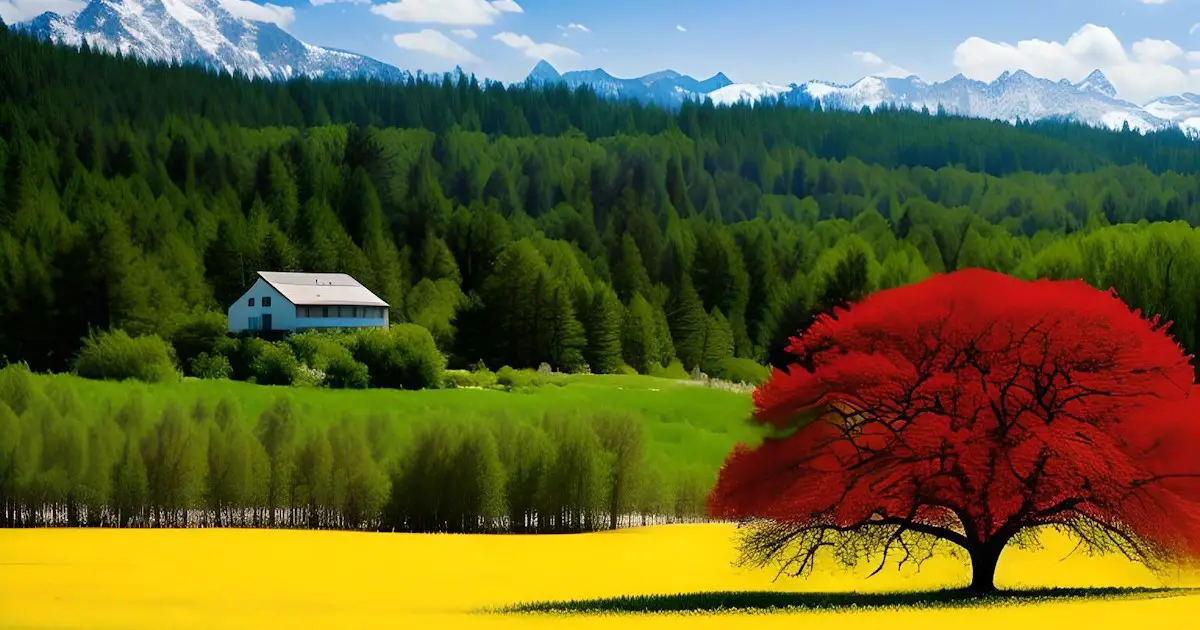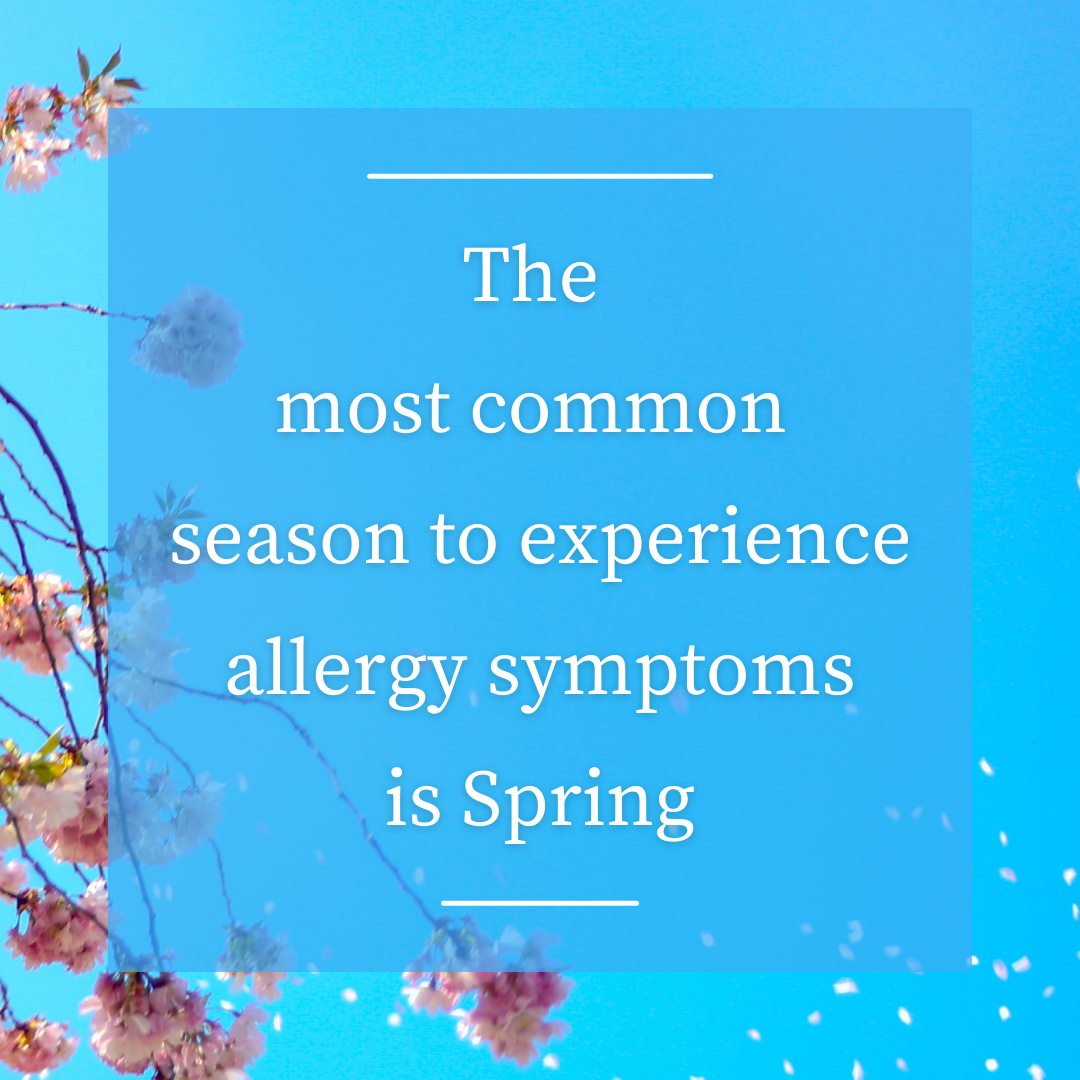Allergy season can be a frustrating time of year. Knowing the answer to “When is allergy season?” can be a complicated question to figure out. Factors like where you live and what you are allergic to, play a role in when the allergy season starts and ends. Let’s dive deeper and find out when the allergy season typically starts and ends.
I am allergic to everything outdoors, and half the things that cause allergies indoors.
Knowing when the allergy season is, and how long it typically lasts helps me prepare for my symptoms. By reviewing this allergy season information, you will be better equipped to lessen or even prevent your allergy symptoms.

As an Amazon Associate, I may receive compensation from qualified purchases.
Table of Contents
When is allergy season?

Allergy seasons vary from person to person, the season depends on your allergy triggers. Typically, the “allergy season” is from spring into summer, as this is when most plants are in bloom.
Your allergy season will also depend on where you live. The temperature outside plays a big role and affects when plants grow and produce pollen. Warmer climates may see an earlier allergy season versus cooler areas of the country.
Overall, the term “allergy season” is a fluid timeline that can vary.
How do you know when it’s YOUR allergy season?

You will know when it’s allergy season depending on the time of the year, knowing what you are allergic to, and if/when you are having any allergy-related symptoms. Many allergy sufferers suffer from pollen allergies, so it is safe to assume that spring and summer will be the allergy season for many individuals.
When is allergy season for mold allergies? If you have a mold allergy, the allergy season may only be in the rainy months, when mold growth is at its highest. Additionally, the mold may be in damp places like basements and bathrooms of your house, giving you symptoms all year long.
Knowing your allergy causes will give you an advantage in figuring out when your specific allergy season is beginning.
If you are having allergy symptoms all year long, but it is worse during certain seasons, you may have seasonal allergies as well as chronic allergies to something you are always exposed to (pets, dust mites, mold, etc.)
When does allergy season end?

According to Johns Hopkins Medicine, the allergy season ends in mid-October for most of the United States. By mid-October, the tree, weed, and grass pollens are no longer being released, thus the season is considered over.
What is the most common season for allergies?

The most common season for allergies is Spring. Spring starts around March 20th and ends around June 20th. March through June is when most pollen is active and at its peak.
What month is most common for allergies?
The month that is most common for allergies is April. The month of April is usually the peak month for tree pollen and is the beginning month for grass and weed pollen. Due to so many types of pollen being active at one time, April may be the month you want to stay indoors if you suffer from seasonal allergies.
How to prepare for allergy season

Preparing for allergy season requires a proactive approach to minimize symptoms and maintain overall well-being. Here is a list of ways to prepare for and prevent allergy symptoms:
- Change air filters
- Change your clothes after allergen exposure
- Clean and dust
- Consider nasal steroids
- Keep windows shut during peak season
- Know what causes your allergies
- Look into starting allergy shots
- Track local pollen levels
- Try Antihistamines
- Use a HEPA filter
- Use nasal irrigation
- Wear a face mask outdoors
The cause of seasonal allergies

The cause of seasonal allergies starts with your immune system. An allergy is an immune response to a substance that doesn’t normally cause symptoms in people. Your immune system sees the allergen (pollen for example) as a threat to your body. The immune system kicks into overdrive to “destroy the threat” during this process when you being to show signs and symptoms of allergies.
How do I know if I’m experiencing seasonal allergies?

You will most likely know you are experiencing seasonal allergies by the symptoms you are faced with during certain times of the year (season). Here is a list of common seasonal allergy symptoms:
- Allergic shiners (dark bags under eyes)
- Congestion
- Cough
- Hives (urticaria)
- Itchy nose, throat, and/or mouth
- Itchy, watery eyes
- Postnasal drip
- Runny nose
- Sinus pressure
- Sneezing
- Trouble breathing
What are the worst symptoms of seasonal allergies?
The most serious, and considered to be the “worst” symptoms of seasonal allergies are trouble breathing and anaphylaxis. Both of these conditions are serious and could be life-threatening.
The runner-up worst symptoms vary from person to person, as it depends on how your body reacts, and whether or not the symptoms interfere with your daily activities.
Seasonal allergy treatment options

So, it’s allergy season and you are having symptoms, time to discuss treatment options. Luckily there is something you can do about your symptoms this allergy season, ranging from natural remedies to immunotherapy.
Medications for Seasonal Allergies
Seasonal allergy treatment options are something to discuss with your medical provider. But, here are the typical treatment options for you to bring up with your primary care physician. Here is a list of seasonal allergy treatment options that are outlined by AAFA.org:
- Allergy Shots (immunotherapy)
- Antihistamines
- Corticosteroid creams or ointments
- Decongestants
- Epinephrine
- Mast cell stabilizers
- Nasal corticosteroids (nose sprays)
- Oral corticosteroids
- Steroids
Natural seasonal allergy remedies
The Detroit Sinus Center has found a few natural approaches to treating symptoms during the allergy season.
Clean your nasal passages to rinse away allergens
Your sinuses can get gummed up with pollen or other irritants, which cause allergy symptoms. Cleaning out your nasal passages with a natural saline rinse may help drastically. You can pick up nasal rinse products like these to get you the relief you are looking for.
Use essential oils

You may sniff the essential oils directly, diffuse them into a room, or place them on your wrists. The Detroit Sinus Center recommends that you use a menthol-based essential oil for best results.
Examples of Menthol-Based Essential Oils
- Eucalyptus
- Peppermint
- Spearmint
Clean your home

During the allergy season, allergens are floating around everywhere, and you are probably tracking them into your home. Cleaning and dusting will remove the allergens from the surfaces, so you can avoid having symptoms indoors.
You must use a vacuum that has a HEPA air filter to prevent allergens from being blown around the house. You can pick up a high-quality vacuum for under $100.
Try herbal remedies
Detroit Sinus Center also mentions that the herbs quercetin and butterbur may help clear up symptoms. Quercetin is an antioxidant flavonoid (comes from plants) and butterbur works like a (natural) antihistamine.
Acupuncture
Acupuncture may help with relieving your allergy symptoms. This medicinal practice has been around for ages and also has science backing it up. If you are not afraid of needles, this could be a good natural remedy for you.
Looking for all the natural remedies?
There are quite a few other holistic remedies you can try, get the whole list by checking out Best Natural Pollen Allergy Remedies.
